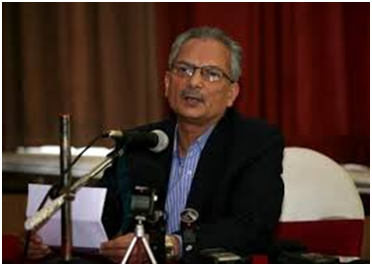Nepal's Bhattarai Set To Form New Party, More Splits In UCPNM Expected
Nepal Maoist leader Baburam Bhattarai leaves the party he co-founded

NEW DELHI: The Resignation of Dr Baburam Bhattarai from the United Communist Party of Nepal (Maoist), UCPNM, has not come as a real surprise for the readers of the Citizen. The break was delayed because the prolonged constitution drafting process Baburam’s intentions were visible on his face during his farewell press conference yesterday. His voice betrayed an excitement of a leader who is ready to explore new possibilities, and is clearly set to form a new political party.
The two main architects of the Maoist insurgency, Prachanda and Baburam, in Nepal were never able to come to terms with each other. Even during their underground days, they usually stood in opposite camps on many vital issues concerning the party’s ideological and political line. From the start of the civil war until it lasted there was hardly a year in ten years when news of their rivalry, threatening the existence of the movement, didn’t surface.
Prachanda’s loyalists often blamed Baburam of brewing ambition to oust him, at least ideologically. Prachanda, a shrewd politician knew that he needed Baburam on his side to make the struggle look more than an armed conflict. Baburam’s presence, a Ph.D from JNU, gave the party a facade to win over the middle class, which Prachanda believed was necessary for the movement to grow. Although he never tried to put a stop to the anti-Baburam campaign in the party he never seriously wanted to lose Baburam. He even allowed Baburam to write some of the important political documents during and after the insurgency. For Baburam, playing second to Prachanda, even when he was being humiliated was compulsion. He knew that without Prachanda it would be impossible for him to convince the party leadership to accept ‘bourgeoisie’ democracy as the goal of the movement.
Like the unity, the break too was a compulsion for Baburam who has been burning the midnight oil to carve an independent path for himself for long. In the last three years he has projected himself as a leader of a new age. He is the most active Nepali leader on Facebook and his idea of politics, corruption free, transparency, austerity, finds resonance among young Nepalis who are exposed to, thanks to smartphones, the state of politics in the world. Since 2012, he has been advocating ‘leadership of a new type’ for Nepal and consciously belittling Prachanda’s style of politics. Baburam, known for hardhearted reasoning, knows that shedding his ‘Maoist’ legacy is now necessary to win over youth in the changed politics of his country.
The move is obvious so is the outcome. Within days, several leaders will join Baburam’s bandwagon and leave Prachanda sulking. Prachanda, who was once described by the Time of India as a ‘Fidel Castro of South Asia’ seems set to outlive his utility.



